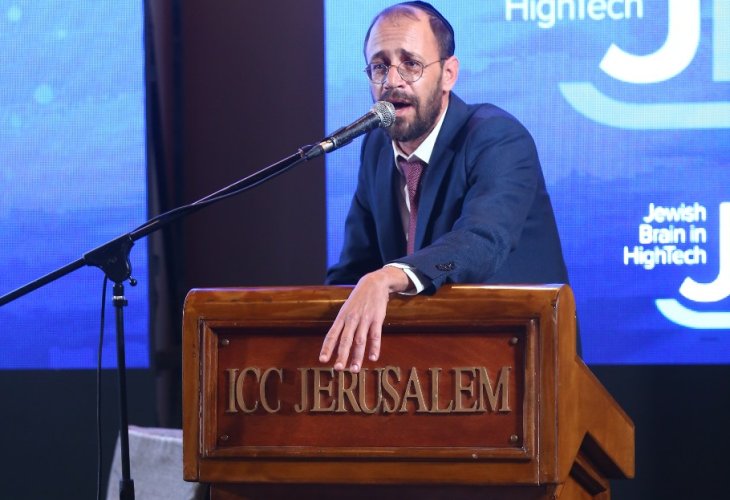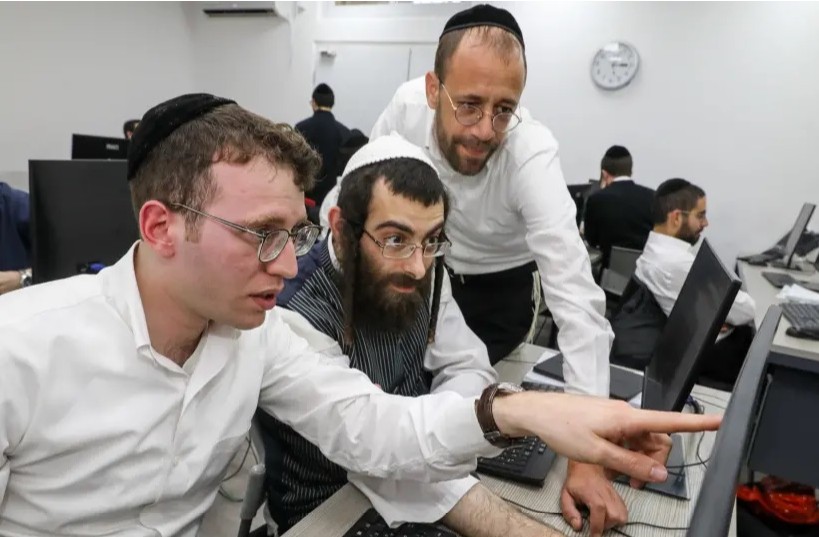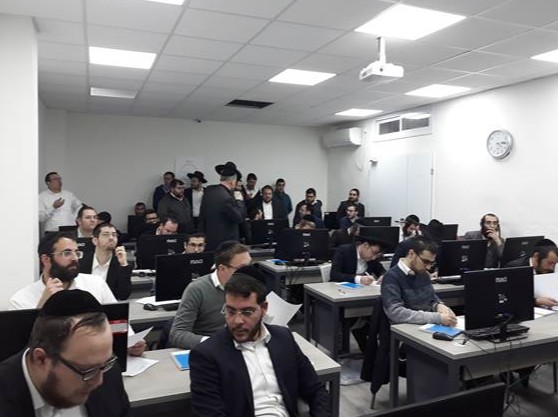The Key to Haredi High-Tech: "Yeshiva Scholars Want Livelihood, But Not at the Expense of Torah Study"
"We saw that yeshiva scholars need livelihood but have no profession, so we considered developing a Haredi high-tech company," says Aharon Saprai, who for the past seven years has been ensuring the training of hundreds of Haredim in the field, while not abandoning Torah study.

"Study in the morning, work in the afternoon" is the motto that has guided Aharon Saprai in recent years and accompanies his activities in the field. Saprai, a resident of Elad, went through the traditional Haredi track throughout his life, meaning: cheder, large yeshiva, and study at a kollel. Later, he managed the office of the city rabbi in Elad and even managed a kollel in the city with about 400 scholars.
Until about seven years ago, Saprai was not connected to the world of high-tech, but then a turning point came. "One day, Rabbi David Leibel approached me and asked to meet," Saprai recounts. "He explained to me that there is a great crisis in the community and it needs a solution – there are scholars who need a livelihood, but they have no way to work due to the severe barriers that make it difficult for them to bring income home. He also added and explained what I knew – the scholars do not wish to obtain a degree from a university or elsewhere, they want to study in a Torah atmosphere and keep everything they are accustomed to, and more importantly, they want to remain in the world of Torah study, which is what they grew up with; they don’t want work and studies to completely remove them from the Gemara."

At the Highest Level
For anyone who thinks this sounds like a conflict, they probably haven’t heard of the unique initiative currently underway in Bnei Brak and Jerusalem. Saprai was fortunate to be one of its founders, and all his intention is to provide livelihood in the high-tech industry while strictly maintaining Torah study and a Torah lifestyle.
"We established this initiative about seven years ago," he says, "At first, we deliberated over training in several fields, but very quickly decided on the field of computers. Rabbi David Leibel, as the one who conceived the idea, sat down with several people from high-tech and consulted them if it is possible to conduct a rapid learning process of high-tech for Haredim, and whether there is a possibility of studies spanning only part of the day and not all of it, so that Torah study can occur in the morning and then professional learning in the afternoon. Of course, along the way, the aspiration was for the scholars to eventually find respectable employment, not just receive a certificate."
From here, Saprai says, the idea was born to add to computer studies by establishing a software house that would essentially continue the training, where students could integrate into work after their studies.
"We thought a lot before launching the initiative," he notes, "We consulted many academia sources and tried to learn from them about the correct and most accurate form of education. Throughout the process, senior people from the high-tech field accompanied us, and after several months of deliberations and clarifications, we decided to set out. Initially, we thought of waiting for funding and recognition from the State of Israel, but we quickly realized that if we continued to wait, the initiative would not come to fruition, so we concluded it’s better to take the burden upon ourselves – we, who understand so well the needs and challenges of the Haredi community, would be able to establish the initiative in the best way possible."
Saprai emphasizes that this is not a project for an exit or to promote any product. "Our idea is solely to generate a source of livelihood for people," he clarifies. "This is our only goal."
And where do the budgets come from?
"Indeed, there is a need for significant budgets because even before our students begin their training, we already need to finance the NIS 2000 they receive as a monthly stipend, as it is clear to us that they cannot be disconnected from learning without providing them with an alternative to the stipend they received until then as scholars. Practically, the project is based mostly, about 80%, on philanthropy, and the remaining 20% we receive through the state. Regarding the software house, we are still incurring losses, but our aspiration is that eventually, the software house will cover itself through the profits it earns, and with these amounts, we will be able to support the students. It's clear this will take time because a software house by its nature only brings in workers after it has work for them, whereas for us it’s the opposite. But we believe that this day will come, which is our hope."
Saprai adds that there are many good people, both from the general public and from the Haredi community, who are partners in this project and it is important for them that it succeeds. "It is important for me to emphasize," he adds, "that only the best forces are with us. It is not easy to get accepted by us; each cycle we receive around 700 applications but only open two groups of 30 students each time. The studies include about 1500 hours, equivalent to engineering studies, but in practice, we do not award any degree because our goal is not to turn scholars into academics, but to provide a respectable livelihood in the high-tech industry in a way that suits them. In the end, they are tested on official exams adapted to the Haredi community, so their knowledge is proven and known."

Not Abandoning the Gemara
Saprai emphasizes that their aspiration is that even after finishing their studies, they will continue to rigorously learn for a few hours every morning, and only then get to work. "That is why we offer the software house that operates in a similar format, with work only starting at twelve in the afternoon," he clarifies. "Of course, the choice is in the hands of each student, and whoever prefers to work elsewhere is welcome to do so. It is a personal decision, but in practice, about 60% of the students continue to work with us, which means at any given moment, we have over 100 employees in the software house. The great advantage of being able to work with us is also because in high-tech, the most important thing is gaining experience. This way we ensure that our students have a place to do their internships and gain experience."
Do you think a Haredi scholar who hasn’t studied English and barely engaged in general studies can succeed at such a high level of study?
"My answer is twofold – English is very important in the high-tech world and can definitely be a hurdle for those who are not proficient in it, but it is not related to talent. On the other hand, everything related to math is actually very strong among Torah scholars, even though they have never studied the subject thoroughly. From my familiarity with the field, I see that a scholar used to learning with a study partner for hours since being in yeshiva gains a huge advantage that allows him to acquire the material much quicker. I can state a clear fact here: within three months, our students take Ministry of Education exams at the level of three units and achieve excellent grades, with an average of 85%. Outsiders do not believe it’s possible, but reality shows that if you have a good head and strong concentration skills, you probably don’t need all the prolonged studies in high school."
He says he often sees among his clients outside the Haredi sector how they begin to abandon many stereotypes they had about the community. "They see before them straightforward people who think well and manage to reach great achievements, alongside maintaining their study habits undisturbed. They understand that a Haredi individual is capable of bringing in a respectable income and still maintaining his yeshiva and scholar character. It’s not that someone comes and explains this to them, but they simply see it themselves, and in my opinion, this is the greatest sanctification of Hashem that we are privileged to make here."

